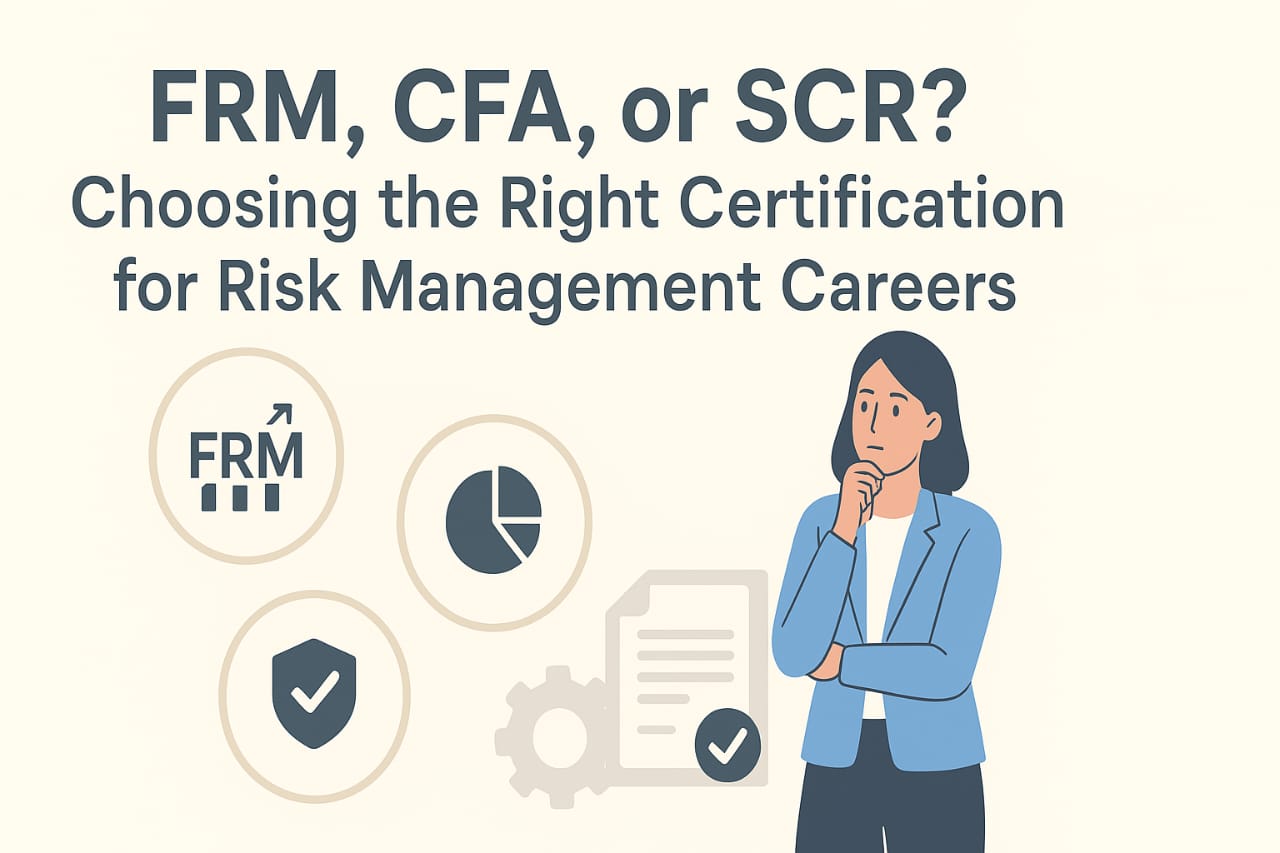
Blog
FRM, CFA, or SCR? Choosing the Right Certification for Risk Management Careers

Introduction: Why Risk Management Certifications Matter in India
In today’s volatile financial world, risk management has become one of the most in-demand skills. From banks and investment firms to insurance companies and consulting giants, organisations are actively hiring professionals with strong risk expertise. If you are planning a career in this space, choosing the right certification is critical.
Among the most recognised options are the FRM certification in India, the CFA certification in India, and the SCR certification in India. Each of these credentials caters to different career goals, and understanding their strengths can help you make the right decision.
FRM Certification in India
The Financial Risk Manager (FRM) designation by GARP is one of the most sought-after certifications for risk professionals.
- Eligibility: Open to graduates, though most candidates have finance, economics, or business backgrounds.
- Syllabus: Two levels covering risk analysis, market risk, credit risk, operational risk, and quantitative methods.
- Career Prospects: Popular roles include Risk Analyst, Market Risk Manager, Credit Risk Specialist, and Portfolio Manager.
- Salary in India: Mid-level FRM holders can expect ₹10-20 LPA, with higher salaries in top investment banks.
Learn more: FRM Course Details
CFA Certification in India
The Chartered Financial Analyst (CFA) program by the CFA Institute is globally respected, particularly in investment management.
- Eligibility: Open to final-year undergraduates and professionals.
- Syllabus: Three levels covering equity, fixed income, portfolio management, economics, and ethics.
- Career Prospects: CFA charterholders often work as Equity Analysts, Portfolio Managers, and Wealth Advisors.
- Salary in India: Average packages range from ₹8 to ₹ 18 LPA, with higher ranges at multinational firms.
Explore further: CFA vs FRM: Which Certification is Better for Finance & Risk Careers?
SCR Certification in India
The Sustainability and Climate Risk (SCR) certification, also offered by GARP, is designed for professionals looking to specialise in climate and sustainability risks.
- Eligibility: No strict prerequisites; ideal for finance, sustainability, and ESG professionals.
- Syllabus: Climate science basics, regulatory frameworks, ESG investing, and transition/physical risks.
- Career Prospects: Careers in ESG consulting, sustainable finance, regulatory compliance, and climate risk management.
- Salary in India: Salaries vary widely (₹7–15 LPA) depending on role and sector, with rapid growth expected in the coming years.
Must-read: SCR Certification in 2025: Your Gateway to Climate Risk Management Careers
FRM vs CFA vs SCR: Key Comparisons
Here’s a snapshot of the differences between these three leading risk management certifications in India:
| Feature | FRM Certification | CFA Certification | SCR Certification |
|---|---|---|---|
| Focus Area | Financial Risk, Market & Credit | Investments, Portfolio, Equity Research | Climate & Sustainability Risk |
| Exam Levels | 2 | 3 | 1 |
| Recognition | Strong in Risk Management | Strong in Investment Management | Emerging, growing in ESG & Sustainability |
| Career Paths | Risk Analyst, Risk Manager | Portfolio Manager, Equity Analyst | ESG Analyst, Sustainability Risk Manager |
| Industry Demand | Banking, Consulting, Risk Advisory | Investment Banking, Asset Management | ESG Finance, Regulatory Bodies |
Which Certification Should You Choose?
- Choose FRM if you want to specialise in financial risk management certification and work in banks or consulting firms.
- Choose CFA if your goal is to build a career in investment management and portfolio analysis.
- Choose SCR if you are interested in the future of sustainability, climate finance, and ESG risk.
Ultimately, the best certification depends on your career aspirations. If your passion lies in financial markets, CFA is a great choice. For risk-focused careers, FRM is unmatched. For those who want to work on the intersection of finance and sustainability, SCR is a rising star.
FAQs
Q1. Which certification is best for risk management in India?
Ans. FRM is considered the gold standard for financial risk management, while SCR is best for climate risk, and CFA is ideal for investment careers.
Q2. Is FRM better than CFA in India?
Ans. Neither is “better”; it depends on your career path. FRM is risk-oriented, while CFA is investment-focused. Many professionals pursue both over time.
Q3. Is the SCR certification worth it?
Ans. Yes, as sustainability and ESG become central to finance, SCR offers a competitive edge in a growing field.
Q4. Can I do FRM or CFA without work experience?
Ans. Yes, both allow students or fresh graduates to register and complete exams, though full certification requires relevant experience.
